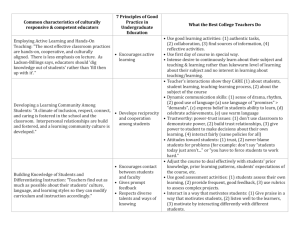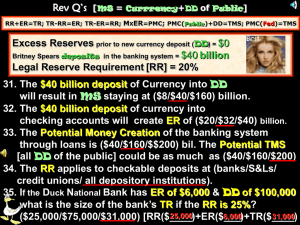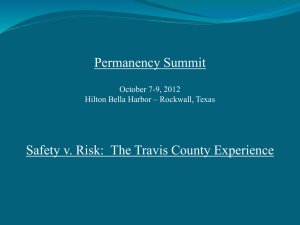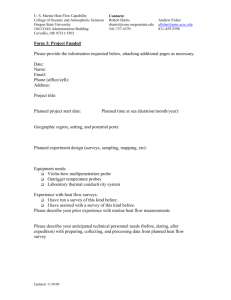Chapter 16 - Partnerships and Programme
advertisement
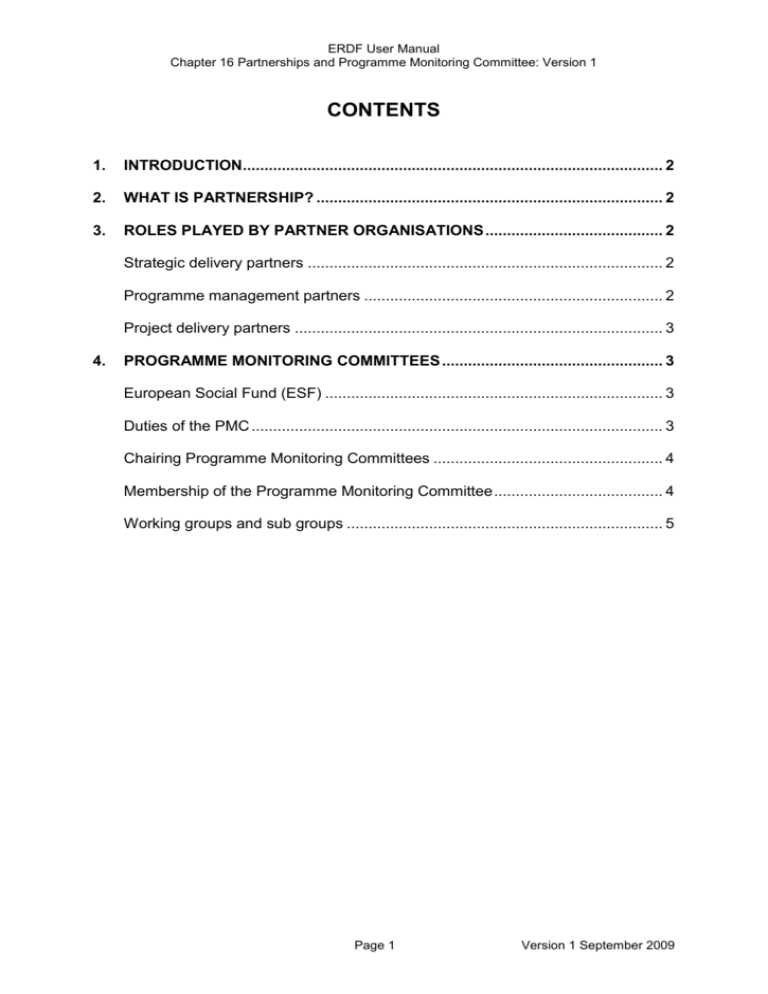
ERDF User Manual Chapter 16 Partnerships and Programme Monitoring Committee: Version 1 CONTENTS 1. INTRODUCTION................................................................................................. 2 2. WHAT IS PARTNERSHIP? ................................................................................ 2 3. ROLES PLAYED BY PARTNER ORGANISATIONS ......................................... 2 Strategic delivery partners .................................................................................. 2 Programme management partners ..................................................................... 2 Project delivery partners ..................................................................................... 3 4. PROGRAMME MONITORING COMMITTEES ................................................... 3 European Social Fund (ESF) .............................................................................. 3 Duties of the PMC ............................................................................................... 3 Chairing Programme Monitoring Committees ..................................................... 4 Membership of the Programme Monitoring Committee ....................................... 4 Working groups and sub groups ......................................................................... 5 Page 1 Version 1 September 2009 ERDF User Manual Chapter 16 Partnerships and Programme Monitoring Committee: Version 1 1. INTRODUCTION 1.1. This chapter deals with partnership and Programme Monitoring Committees. It provides a description of the principles of partnership in relation to Structural Funds policy and it defines the roles of the different partner organisations including strategic delivery partners, programme management partners and project delivery partners. 1.2. It also contains information on the Programme Monitoring Committees (PMCs). The main tasks of the PMC are prescribed in Article 65 of Regulation 1083/2006 and in the Implementing Provisions within each Operational Programme and are not repeated here. This chapter summarises other additional duties and tasks 2. WHAT IS PARTNERSHIP? 2.1. Partnership is one of the basic principles underlying the current approach to Structural Funds policy and is governed by Article 11 of Regulation 1083/2006 To ensure the relevance of the strategies pursued and the effectiveness of expenditure, the programming and management of Structural Funds brings together all the parties involved in economic and social development. They include the Member State and the Commission, but also the other authorities or partner bodies designated by the national authorities. These may be other relevant public authorities, at regional and local level, or other appropriate bodies. 2.2. The commitment and necessary consensus between the various parties involved is achieved through ongoing dialogue throughout the programming process. Partners should be involved as soon as preparation begins on the Operational Programmes (OP). Partners are then involved in monitoring the implementation and the financing of the programmes by being part of Programme Monitoring Committees and their sub-groups and also in the various evaluation exercises. 3. ROLES PLAYED BY PARTNER ORGANISATIONS 3.1. Partners consist of many different organisations, with wide-ranging roles in programme delivery: Strategic delivery partners 3.2. Operational Programmes can only function within the wider regional strategic planning process in order for the priorities and objectives to be set in line with Government policy. Partners, such as the Government Offices, the Regional Development Agencies (RDAs) and the Regional Assemblies are all involved in the development of regional strategies. They can ensure that European funding is allocated to the highest priorities and can identify where the focus can be shifted as the Programmes develop. Programme management partners 3.3. The formal role of the programme management partners will be as members of the Programme Monitoring Committee. The terms of reference setting out the roles and responsibilities for the PMC will be agreed when the committee is established. Membership of the PMC will be open to the principal regional partners, Government representatives, the private and voluntary sectors, local authorities, and others with a specific stake in the OP. The Commission, the European Investment Bank and the European Investment Fund may participate in an advisory capacity. Page 2 Version 1 September 2009 ERDF User Manual Chapter 16 Partnerships and Programme Monitoring Committee: Version 1 Project delivery partners 3.4. Delivery partners are those organisations that contribute to the OP via specific individual projects and need not necessarily have a strategic overview. They join the process as applicants or match funders. They may be, for example, large organisations such as local authorities or a community group with a small role on a research project. European secretariats must develop strong relationships with these partners to ensure that targets set are realistic in the first place and that targets are fully met within agreed time limits. 4. PROGRAMME MONITORING COMMITTEES 4.1. The PMC is a strategic body responsible for overseeing the implementation and monitoring of the Operational Programme for its area. It will seek to maximise integration and linkages with other OPs and, where appropriate, other European Funding Programmes. 4.2. In England, there are nine regional ERDF Competitiveness OPs and one ERDF Convergence OP (Cornwall and the Isles of Scilly). The RDAs provide the Secretariats for each regional ERDF OP and associated PMC. European Social Fund (ESF) 4.3. In England there is one national OP and associated national PMC for the European Social Fund. Activities are delivered through regional ESF frameworks and are managed by regional framework committees. The national ESF PMC has made it clear that, where appropriate, joint committees should be established to oversee both the ERDF and ESF programmes at regional level. Duties of the PMC 4.4. There are other important duties of the PMC, in addition to those prescribed by the Articles 65 of Regulation 1083/2006. These other duties include : a. To agree a communication plan for the Operational Programme. The communications plan is developed by the RDA and agreed by the PMC. All RDAs submitted their plans through the Managing Authority (MA) within four months of the OP being approved by the Commission. All the plans have received Commission approval b. To agree a costed strategy for Technical Assistance (TA) and to agree the mechanism for providing match funding for the budget. Further information on TA is in Chapter 12. c. To set up such sub-committees and/or working groups as appropriate to enable it to fulfil its responsibilities. The terms of reference of these delegated committees and groups must be approved by the PMC. d. To agree its own terms of reference and working practices. e. To agree its membership and to ensure that it seeks to represent the demographic make-up of the area covered by the OP and takes account of the need to promote equality between men and women. f. To consider whether to adopt a code of conduct governing standards of behaviours. Page 3 Version 1 September 2009 ERDF User Manual Chapter 16 Partnerships and Programme Monitoring Committee: Version 1 g. To agree, where appropriate, an evaluation plan for the programme, to cover the evaluation activities to be carried out during the programme period. Chairing Programme Monitoring Committees 4.5. The chair of the PMC has to be undertaken by a representative of the Member State or the Managing Authority1. In practice, this will be the Regional Director of the relevant Government Office, except for London, where the chair will be the Mayor or his representative. 4.6. The general regulation2 requires that ERDF objectives shall be pursued in the framework of close cooperation, which means the Commission will expect the programmes to be implemented in a spirit of partnership. 4.7. The Chair will ensure that those on the committee are the most representative bodies at regional and local level and in the economic, social, environmental or other spheres (ie partners), in accordance with national rules and practices. 4.8. The Chair will be expected to refer to the Secretariat for advice on ensuring that PMC membership remains up-to-date and the representation needs of the regional partnership are fully met. 4.9. Representatives from other bodies concerned with the operation of the Structural Funds in the Programme area may be co-opted by the PMC or may be invited to attend on occasion as appropriate. 4.10. The Chair will ensure that a record is kept of all decisions made by the PMC. The Chair will also agree all PMC papers that are distributed and the minutes of PMC meetings. Ideally papers will be distributed 10 working days before a PMC meeting to allow members time to consult their colleagues as necessary. Each PMC can determine whether papers are sent out in hard copy or electronically, but electronic copies of papers must be retained and placed on the RDAs website except where there are commercial or personal confidentiality concerns. 4.11. The Managing Authority will be represented on the PMC. The role will include advising and guiding the PMC Chair and members on compliance with the Regulations and any other aspect of running the OP. 4.12. The MA representative will also guide the PMC on Government policies and report back to Ministers on how the OP is progressing and how its activities are contributing to wider Government policy. 4.13. The region’s DG Regio desk officer will be invited to be an observer at PMC meetings. Membership of the Programme Monitoring Committee 4.14. The partnership should remain fully representative throughout the life of the PMC. Where PMC members withdraw for whatever reason, then their replacement will not automatically be taken from the same organisation. The Chair will be expected to agree with the PMC a systematic process for membership review and renewal. 1 2 Article 64(1) of Regulation 1083/2006 Article 12 of Regulation 1083/2006 Page 4 Version 1 September 2009 ERDF User Manual Chapter 16 Partnerships and Programme Monitoring Committee: Version 1 4.15. PMC members may send a named deputy to attend meetings in their place. Members who do not attend three consecutive meetings will be removed from the PMC unless the Chair considers there was justification for the absence and the partnership would be weakened if they were removed. 4.16. The Programme Monitoring Committee may consist of regional partners including, but not limited to, the following organisations: Chair (GO RD or his deputy) Managing Authority RDA Local Authorities Regional TUC JobCentre Plus Higher education and further education Business Links Private Sector (e.g.CBI, Chambers of Commerce) Voluntary Sector. Working groups and sub groups 4.17. Additional sub or working groups may be set up on a thematic or sub-regional basis to address specific issues or more local programme priorities or with delegated authority to endorse projects. Membership of such groups will be drawn from community and regional organisations with individual members being nominated by their host organisation. Page 5 Version 1 September 2009
